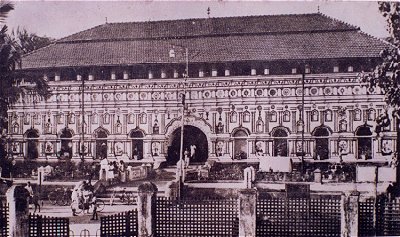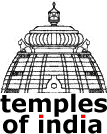Marikamba Temple of Sirsi
by Dr. Jyotsna Kamat
First Online: August 05, 2003
Page Last Updated: December 07, 2024
In India, every village contains a small temple dedicated to various local form of goddess Mari or Mariamma who is worshipped as goddess of fertility and dispeller of epidemics. Goddess Mari or Marika at Sirsi is especially worshipped as the presiding deity of all epidemics like small pox, plague, cholera and natural disasters like floods, famines and cyclones, which take toll of thousands. Through the centuries the frightened population offered sacrifices to appease this fierce and blood thirsty deity.
Mar in Tamil and Kannada means change or concealing (marpadu). The goddess of hidden power (maya) became Amba (mother, Parwati, consort of Lord Shiva) to whom buffaloes, sheep, pigs, and poultry were offered as sacrifice to propitiate her. The deity slowly transformed into Mahishasuramardini (killer of buffalo demon), another epithet of Durga or Parwati.
© K. L. Kamat

Sirsi Marikamba Temple
The huge idol (seven feet tall) of Marikamba was resurrected from a tank on road to Hanagal and a temple was built for her in the year1689. It is the biggest idol and temple dedicated to Marikamba in the state of Karnataka. Earlier, beautiful Kavi paintings adorned the walls of this temple depicting scenes from Ramayana and Mahabharata.
Local purana calls this eight-shouldered deity as Renuka (a.k.a.Yellamma) as well. She is referred to as "Doddamma", elder sister to all younger Mariammas installed in different towns and villages, which control evil spirits and epidemics. Animal sacrifice was quite common to propitiate these deities. But the reform brought in at Marikamba temple completely changed the attitude of masses is worth noting.
© K. L. Kamat

Goddess Marikamba (the ferocious mother) of Sirsi
The head priest of the temple belongs to the Vishwakarma community. Marikamba deity was originally a deity of dalits or depressed classes and offering animals had come down from centuries. Eighteen buffaloes, thousands of sheep and tens of thousands of fowls were butchered. A special He- buffalo was bred for sacrifice during the jatra (fair) and blood curdling scenes of shouting and ghastly butchering were common. Thousands used to gather from remote places to fulfill their vows of offering bloody puja.
But Gandhian movement brought in change. Educated citizens of Sirsi lead by S.N Keshwain were responsible for this change. Vitthal Rao Hodike, a dedicated teacher and devout Gandhian took the responsibility of educating the masses against the inhuman custom. Keshwain was the chief trusty of the temple, arranged to kidnap the main buffalo on the night before the sacrifice. With extraordinary courage and astuteness, he avoided armed revolt of the angry mob.
In 1933 Gandhiji had taken All India tour for uplifting of Harijans and visited Sirsi as well. But he refused to go to Marikamba temple, a land mark of the town. He expressed great pain at the mass slaughter in the place of worship, which was supposed to have been clean, benign, and place of shelter. He made his feeling of unhappiness known publicly.
The citizens of the town though hurt, vowed to put a stop to the age-old practice. It was an extremely difficult step. Much to his credit, Mr. Keshwain attained it in phases accepting money as offering to the goddess and arranging special puja in place of animal sacrifice. Slowly people gave up the heinous offering. Income of the temple increased. This was used for promotion of education and founding a hospital.
Marikambas fair was one of the biggest in Bombay presidency. It was also the first, which allowed entry to Harijans. Gandhiji congratulated Keshwain for his humanitarian spirit. "Those who wish to may eat meat they like, but it is defaming God to offer animal sacrifices in temples. What God wants, if he can be said to want anything, is the sacrifice made by a humble and contrite heart". He wrote in the April5th 1942 issue of "Harijan", a periodical he used to run..
![]()
See Also:
- Locate the town of Sirsi in the Map of Uttara Kannada
- Given to Goddess -- Article and a number of pictures on the mysterious cult in Southern India called the devotees of Yellamma or Devadasis (temple women)

